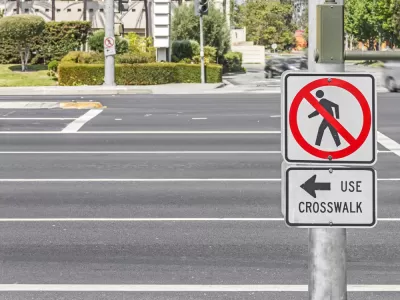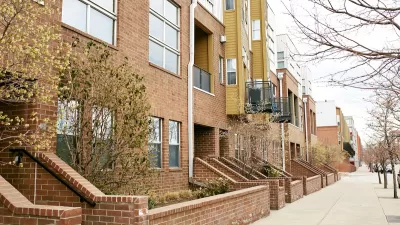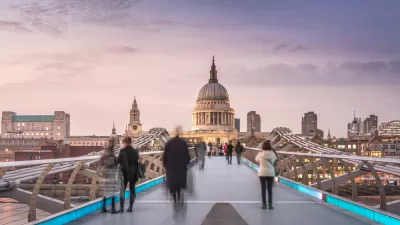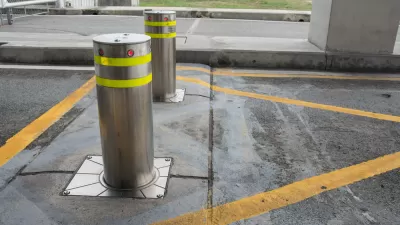Plenty of sidewalks stand in need of improvement, and many aren't there at all. But they're also a symbol of the automobile's engineered dominance of our roads.

According to Alissa Walker, the multi-modal city of the future might lack sidewalks, and that's a good thing. "'Sidewalks' is actually a misnomer," Walker writes, "because before cars existed, all modes of transportation mixed freely in the street: streetcars, carriages, horses, pushcarts, and, most of all, people walking in every direction."
The rise of the automobile pushed pedestrians to the side, and modern roads often deny them a place to walk altogether. "American society has so normalized our inferior sidewalk system that we don't believe we deserve a place to walk."
Meanwhile, a supposed "walking revolution" hasn't materialized, despite Complete Streets redesigns and campaigns to promote walking. "In 2016, Americans drove more miles than they have in any other year in history."
Frustratingly, says Walker, pedestrian improvements are now often perceived as a sign of gentrification. "Yet clean, safe, unbroken sidewalks have become such a rarity in this country that designing an area where people can get around primarily by walking—the one mode of transportation that is available and accessible to everyone—is now seen as a harbinger of displacement."
Truly shared streets would open up space for new modes, and a return to old ones. And as boomers age out of driving, we may see rising momentum for real pedestrian improvements.
FULL STORY: The case against sidewalks

Alabama: Trump Terminates Settlements for Black Communities Harmed By Raw Sewage
Trump deemed the landmark civil rights agreement “illegal DEI and environmental justice policy.”

Planetizen Federal Action Tracker
A weekly monitor of how Trump’s orders and actions are impacting planners and planning in America.

How Atlanta Built 7,000 Housing Units in 3 Years
The city’s comprehensive, neighborhood-focused housing strategy focuses on identifying properties and land that can be repurposed for housing and encouraging development in underserved neighborhoods.

In Both Crashes and Crime, Public Transportation is Far Safer than Driving
Contrary to popular assumptions, public transportation has far lower crash and crime rates than automobile travel. For safer communities, improve and encourage transit travel.

Report: Zoning Reforms Should Complement Nashville’s Ambitious Transit Plan
Without reform, restrictive zoning codes will limit the impact of the city’s planned transit expansion and could exclude some of the residents who depend on transit the most.

Judge Orders Release of Frozen IRA, IIJA Funding
The decision is a victory for environmental groups who charged that freezing funds for critical infrastructure and disaster response programs caused “real and irreparable harm” to communities.
Urban Design for Planners 1: Software Tools
This six-course series explores essential urban design concepts using open source software and equips planners with the tools they need to participate fully in the urban design process.
Planning for Universal Design
Learn the tools for implementing Universal Design in planning regulations.
Caltrans
Smith Gee Studio
Institute for Housing and Urban Development Studies (IHS)
City of Grandview
Harvard GSD Executive Education
Toledo-Lucas County Plan Commissions
Salt Lake City
NYU Wagner Graduate School of Public Service





























